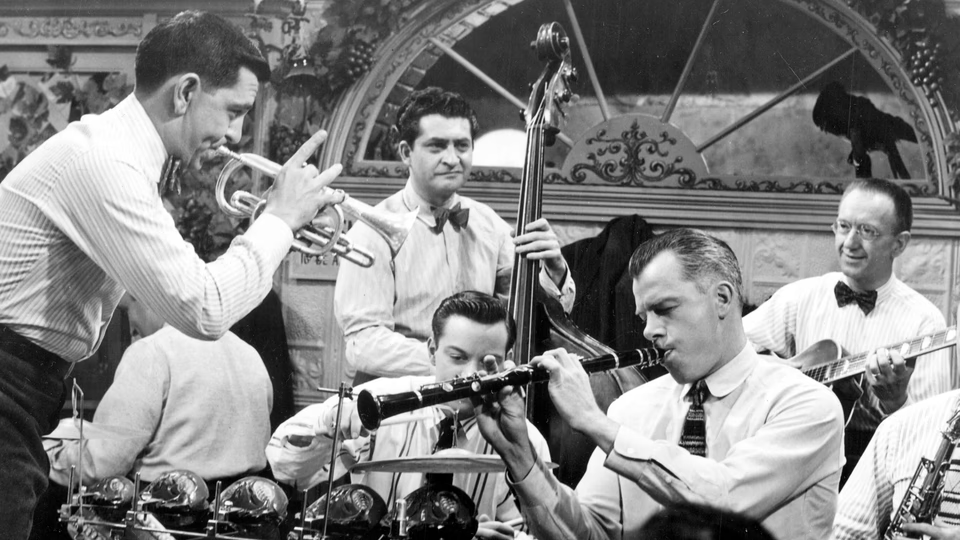Pete Kelly's Blues

Jack Webb produced, directed and stars as the titular Pete Kelly in this jazz-infused crime drama as a hard-boiled, cornet-playing band leader battling a mobster in 1927 Kansas City.
As a producer, Webb shines. The period atmosphere convinces, from the unpaved streets to the bustling speakeasies and dingy dance halls, everything feels lived-in and true. He also assembles a splendid supporting cast, including Janet Leigh as a wealthy flapper who takes an interest in Webb, Edmond O’Brien as the mobster who takes an altogether different interest, Peggy Lee as O’Brien’s alcoholic moll, Andy Devine as a detective after O’Brien, and Lee Marvin as an aging clarinettist in Webb’s band.
As a director, Webb acquits himself well. Aside from some ill-placed day-for-night shots during a car chase, the film displays a confident polish. The opening prologue, detailing the origins of Kelly’s cornet, plays out with no dialogue, and Webb leverages the Cinemascope framing to terrific effect during several set pieces and the band numbers.
And it’s those band numbers where the film shines. The jazz score proves the film’s strength. Webb’s affection for the genre proves evident, but not to the narrative’s detriment. Rather, the jazz numbers serve double duty, providing ambience and—with an Ella Fitzgerald number—advancing the plot.
But about that plot. Lee’s character gets a lot of screen time but proves tangential to the story. Devine’s great as a maybe-crooked detective, but his story also goes nowhere. Instead, the finale sees Webb breaking into one of O’Brien’s operations, an aging dance hall, hoping to get some dirt he can use as leverage. Midway through, the hall’s lights go on and music fills the room. A drunken Leigh has followed Webb. Rather than killing the lights and music, Webb agrees to dance with Leigh. Then O’Brien and his goons arrive for the final showdown. All the rigmarole around a gangster gone into hiding, Lee’s character, and O’Brien’s operations amounts to nothing. The jarring conclusion feels like someone spliced the final reel into the second act.
The hard-boiled dialogue only enhances the sense the film was aiming for Chandleresque mystery. Consider the line in Webb’s opening voice-over, “There’s one other thing about Rudy’s and that’s trouble. You can get it by the yard, the pound, wholesale or retail.” Or Marvin, levelling with Webb, “It won’t blow over. You’re playing with a cold deck, but I don’t blame you, Pete. You wanna keep the band together, you’ve gotta fight back.” Or when Webb asks Lee about her drinking and she replies, “I always start around noon, in case it gets dark early.”
Webb handles this dialogue with aplomb, employing his trademark deadpan delivery. The trouble is, he’s all wrong for the role. Every woman in the script pants over Webb’s character, from the cigarette girls in the clubs to Janet Leigh’s wealthy flapper. But the slight Webb, clad in perpetual bowtie, doesn’t convince as a heart-throb, especially next to Lee Marvin.
And speaking of Marvin, he’s great, convincing as an aging clarinet player weary of another run in with gangsters who serves as Webb’s sounding board and closest advisor. He looks the tough guy Webb’s playing.
Thus, the scene where Webb decks Marvin proves jarring. In what universe does the slender, 5’10 Webb, floor the 6’1 ex-Marine Marvin? A later scene, where Webb again pummels Marvin, got me thinking: What if it’s a fantasy? What if Webb’s character is a satire of the hard-boiled noir protagonist?
In this light, his deadpan dialogue delivery contradicting his squeaky-clean appearance works. As does Leigh’s throwing herself at him, and his pummelling of Marvin. Even his tough-guy dialogue, like when he’s telling Leigh why he’s nice to his pet bird, “I’m nice to him because I may get hungry someday and have to eat him. In a meantime, he can hit G above high C, so I keep him around.”
But just as I was settling into this notion—and crediting the script for its cleverness—it unravels with the abrupt ending. Now, continuing with the satirical theory, one could read the ending as a deliberate send-up of the clockwork-like machinations of Chandler or Hammett, positing that none of it matters next to a drunken Janet Leigh, but I don’t think the script was that clever. More likely, they ran out of steam or money, or both.
So what to make of Pete Kelly’s Blues? As a straight crime drama, Webb’s casting himself in the lead renders it preposterous, but as a satire it works. That it’s perhaps unintentional satire may heighten or lessen your enjoyment, based on your taste. But one aspect remains uncontroversial: the music shines.